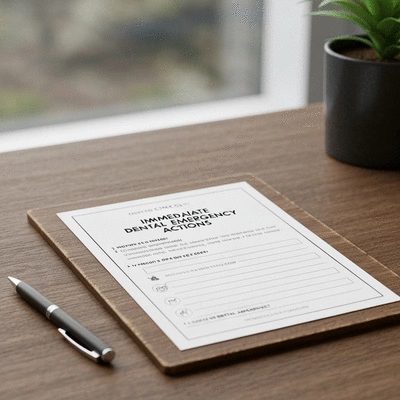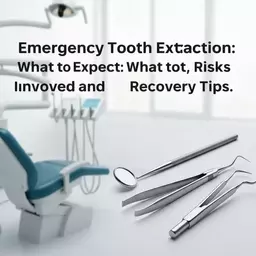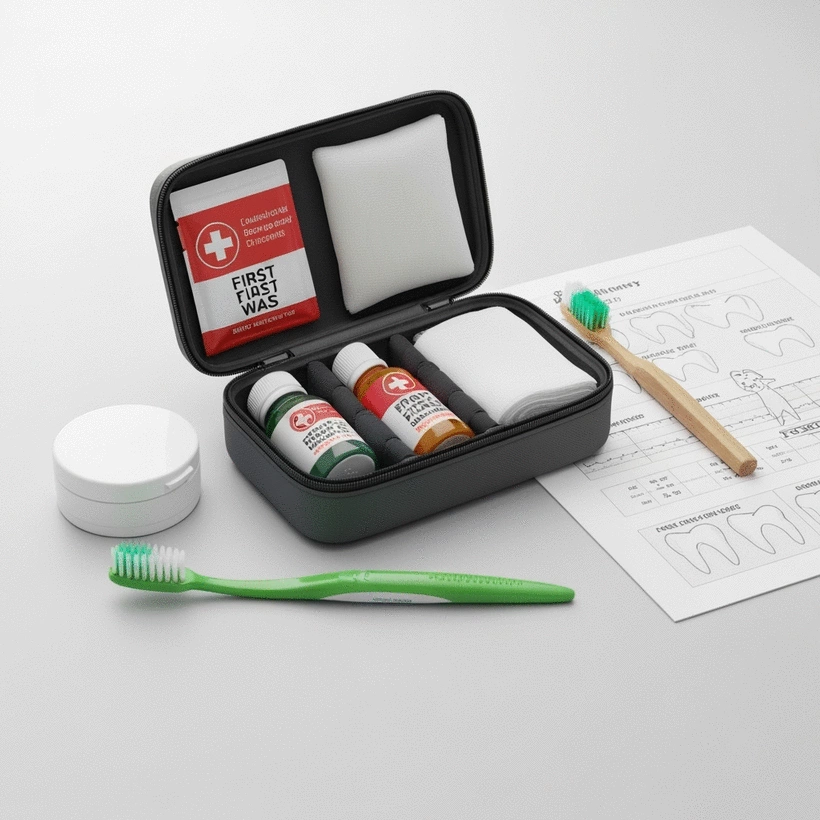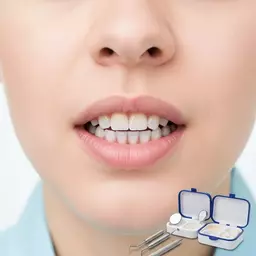Dental Emergency: Immediate Action Steps

What if a sudden toothache or a knocked-out tooth caught you off guard? Understanding how to respond in a dental emergency is crucial for your health and peace of mind. Here’s what you need to know to be prepared!
What You Will Learn
- Recognize what qualifies as a dental emergency, including severe toothaches and knocked-out teeth.
- Understand the importance of immediate action to minimize pain and prevent complications.
- Learn essential first aid steps to take after experiencing a dental emergency.
- Discover resources for finding emergency dental care quickly and effectively.
How to Handle Dental Emergencies: A Quick Guide
Understanding what constitutes a dental emergency and knowing the immediate steps to take can significantly impact the outcome of your dental health.
Situations Requiring Immediate Attention
Urgent Care Needed:
Dental Emergencies
- Knocked-out tooth: Save the tooth.
- Severe toothache: Infection risk.
- Broken/chipped tooth: Prevent further damage.
- Lost filling/crown: Decay prevention.
Why Act Quickly:
Time is Critical
- Minimize pain: Faster relief.
- Prevent complications: Avoid severe issues.
- Improve treatment: Higher success rate.
- Save teeth: Prevent irreparable damage.
Essential Steps After a Dental Emergency
Immediate Actions:
First Aid Guide
- Stay calm: Assess the situation.
- Control bleeding: Apply gentle pressure.
- Knocked-out tooth: Keep it moist.
- Manage pain: Use OTC meds/cold compress.
Next Steps:
Professional Help
- Contact dentist: Immediately.
- Find services: Emergency dental care.
- Don't wait: Time is crucial for saving a tooth.
- Call eDentistNearMe: Find local help 24/7.
Understanding Dental Emergencies: What Are They and Why They Matter
When we talk about dental emergencies, we refer to situations that require immediate attention to prevent further complications. Whether it’s a severe toothache, a knocked-out tooth, or a broken tooth, knowing the signs and understanding the urgency can significantly impact the outcome of your dental health. At eDentistNearMe, we recognize the anxiety these situations can cause, and we're here to help guide you through the process!
In essence, a dental emergency is any issue that demands prompt care. By addressing these conditions quickly, we can minimize damage and relieve pain, ensuring a smoother recovery for you. Let’s delve into the specifics of what qualifies as a dental emergency and why time is of the essence.

Defining a Dental Emergency: Situations That Require Immediate Attention
A dental emergency can encompass various scenarios. Here are some common situations where immediate attention is necessary:
- Knocked-out tooth: This requires urgent care to increase the chances of saving the tooth.
- Severe toothache: Intense pain that could indicate an infection or other serious issues.
- Broken or chipped tooth: This can lead to further damage if not addressed promptly.
- Lost dental filling or crown: Exposing the tooth can lead to decay and discomfort.
Understanding what constitutes a dental emergency is crucial. Each situation demands quick intervention to avoid lasting damage, and I often emphasize to my patients how vital it is to recognize these scenarios early.
The Importance of Quick Action: Why Every Second Counts
When faced with a dental emergency, taking swift action can make a significant difference. Did you know that teeth can die or become irreparable if not treated within a critical time frame? That’s right! The sooner you address a dental emergency, the better the outcome.
Here’s why every second counts:
- Minimizing pain: Quick intervention often results in faster pain relief.
- Preventing complications: Delays can lead to more severe health issues. For more information on what to do in a dental emergency, including severe issues, you can refer to resources like the TRICARE Newsroom.
- Improving treatment success: The earlier you see a dentist, the higher the chances of restoring your tooth.
As part of my mission at eDentistNearMe, I strive to ensure you have access to emergency dental care 24/7. When something goes wrong, don't hesitate—reach out for help immediately! Remember, your oral health is our priority.
We Want to Hear From You!
Have you ever faced a dental emergency? How did you handle it? Share your experiences or thoughts on what you found most helpful in those situations:
Quick Reference Guide: Essential Steps to Remember After a Dental Emergency
When a dental emergency strikes, having a clear plan in your mind can make all the difference! Here's a quick reference guide outlining the essential steps you should remember after experiencing a dental emergency. This will help you respond effectively and ensure you receive the care you need.
- Stay calm and assess the situation.
- Control bleeding by applying gentle pressure with a clean cloth.
- For a knocked-out tooth, handle it by the crown and keep it moist.
- Manage pain using over-the-counter medications or cold compresses.
- Contact your dentist or find emergency dental services nearby.
Having this checklist handy can provide a sense of security. Remember, quick action is key to effective management! Now, let’s explore a visual summary that simplifies these steps even further.

Printable Checklist for Immediate Action Steps
To make it even easier for you, I’ve created a printable checklist that you can keep handy at home or on your phone. This checklist includes all the immediate actions you need to take in the event of a dental emergency, ensuring you won’t miss a step when every second counts. You can download and print it for quick reference!
- Evaluate the injury's severity.
- Apply pressure to stop bleeding.
- Keep a knocked-out tooth moist in milk or saliva.
- Take over-the-counter pain relief if needed.
- Contact an emergency dentist immediately.
Don’t wait until it’s too late! Having this checklist on hand means you’re always prepared to handle a dental crisis more effectively. Let's move on to the next step!
Infographic Summary: Visual Guide to Dental Emergency Management
Visual aids can often clarify complex processes, and I believe an infographic summarizing dental emergency management can be incredibly helpful. This infographic outlines the steps to take, the common situations to watch for, and the immediate actions needed. Keep an eye out on our website for this resource! Having visual cues can reinforce your memory and help you feel more confident in a stressful situation.
Encouragement to Act: Why Contacting Your Dentist is Crucial
Every dental emergency is unique, and knowing when to seek professional help is vital. Contacting your dentist as soon as possible can mean the difference between saving a tooth and losing it! Time is of the essence, and I encourage you to trust your instincts. If something feels wrong, don’t hesitate to reach out for help.
Summarizing Key Takeaways from the Guide
Here’s a quick recap of the essential points we’ve covered:
- Understanding what constitutes a dental emergency.
- Immediate first aid steps to take.
- When to seek professional dental assistance.
- Resources for finding emergency dental care.
These takeaways not only empower you to handle emergencies effectively but also promote a proactive approach to your dental health. Knowledge is power! Now let’s get to the most important part.
Frequently Asked Questions (FAQs)
- Q: What constitutes a dental emergency?
- A: A dental emergency is any situation requiring immediate attention to prevent further complications or to save a tooth. Common examples include a knocked-out tooth, severe toothache, broken or chipped teeth, or a lost filling/crown.
- Q: Why is quick action important in a dental emergency?
- A: Swift action can significantly impact the outcome, helping to minimize pain, prevent severe complications, and increase the success rate of treatment. In some cases, it can be the difference between saving and losing a tooth.
- Q: What should I do if my tooth is knocked out?
- A: Handle the tooth by the crown (the chewing surface), avoid touching the root, and keep it moist. You can try to reinsert it into its socket or keep it in milk or saliva. Contact your dentist immediately.
- Q: How can I manage pain before seeing a dentist?
- A: You can use over-the-counter pain medications and apply a cold compress to the outside of your cheek to reduce swelling and pain.
- Q: Where can I find emergency dental care?
- A: You should contact your regular dentist first. If they are unavailable, services like eDentistNearMe can connect you with local emergency dental care providers available 24/7.
Call to Action: Don’t Wait—Contact Your Emergency Dentist Today!
When it comes to dental emergencies, waiting can lead to complications and increased discomfort. If you find yourself in a dental crisis, contact eDentistNearMe to find emergency dental services available near you! We’re here to connect you with trusted local dentists who prioritize your health and comfort. Don’t hesitate—take action today and ensure your dental wellbeing is in good hands!
Recap of Key Points
Here is a quick recap of the important points discussed in the article:
- Identify what constitutes a dental emergency, such as severe pain, knocked-out teeth, or broken teeth.
- Act quickly to minimize pain and prevent complications; time is of the essence.
- Follow essential first aid steps, including controlling bleeding and contacting a dentist immediately.
- Utilize a printable checklist for immediate action steps to ensure you are prepared.
- Seek professional dental assistance as soon as possible to increase the likelihood of saving a tooth.









